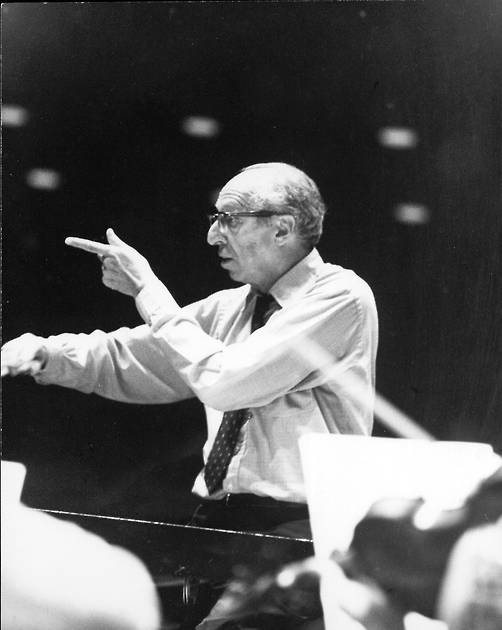

In 1921, he went to Fontainebleau, France to study at the American Conservatory. By the time he was 15, he was studying theory and composition with Rubin Goldmark who was considered a nationalistic American composer. He started formal piano lessons when he was 13 and had already written some small pieces. Copland and his four older siblings developed their interest in music from their mother who played the piano and sang. His parents had emigrated from Lithuania and were active in the Kane Street Synagogue, founded in 1856. With works like Fanfare for the Common Man, Appalachian Spring, and Rodeo, he incorporated folk music, Shaker hymn tunes, and harmonies that resembled the immense and varied landscape, as well as the patriotic and pioneer spirit.Ĭopland was born November 14, 1900, in Brooklyn, NY. In fact, the title of today’s post refers to two very specific periods of Copland’s life in New York: his childhood and the period after his return to New York in 1924 after three years of study abroad, primarily with Nadia Boulanger in Paris.Aaron Copland composed music known for its “American” sound during a time when music in the United States was still heavily influenced by the European composers. The question mark attached to the post title above is appropriate, because as a native New Yorker who lived the great bulk of his life in that singular town, we might rightly wonder when was Aaron Copland not in New York?

I was comforted in making this decision by the fact that I knew I’d be writing about the November 14 birthday boy Aaron Copland in today’s Music History Monday (and in tomorrow’s Dr. My Music History Monday post for June 18, 2018, celebrated the birth of Ignaz Pleyel (1757-1831), and Music History Monday of Octo(six weeks ago today) noted the death (and celebrated the life) of Johann Nepomuk Hummel.Īs it turned out, I chose to feature Fanny Mendelssohn-Hensel in my Music History Monday post of November 14 past (and my Dr. Okay when deciding what to write about two weeks ago on November 14, I was able to knock a couple of names off this list. Heavens: and to think that on some dates, nothing happened. (And finally, on that very day two weeks ago – Novem– the wonderful Robert Flack [born 1937) revealed that she is suffering from ALS (Lou Gehrig’s disease) and is no longer able to sing.) On November 14, 1946, the Spanish composer Manuel de Falla died in Alta Gracia, Argentina, at the age of 69. On November 14, 1939, the composer and synthesizer virtuosa Wendy (“don’t call me ‘Walter’”) Carlos was born in Pawtucket, Rhode Island. On November 14, 1900, the composer Aaron Copland was born in Brooklyn, New York. On November 14, 1831, the Austrian-French composer and piano builder Ignaz Joseph Pleyel died in Paris at the age 74. On November 14, 1805, the composer and pianist Fanny Mendelssohn-Hensel was born in the German city of Hamburg. On November 14, 1778, the composer and pianist Johann Nepomuk Hummel was born in the city of Pressburg, today Bratislava, the capital of Slovakia. On November 14, 1719, the composer, violinist, teacher, and tennis-father-supreme Leopold Mozart (father of you-know-who) was born in the German city of Augsburg. You see, November 14 is one of those crazy dates when so much happened in the world of music that I was hard put to decide what to feature in that day’s Music History Monday. Here’s a decision I made for my Patreon family two weeks ago today, on November 14. It’s difficult enough for me to figure out what to make for dinner.) The decisions I do make are for myself and for my families: my immediate family and my Patreon family. (I cannot imagine having to make decisions that would affect the health and welfare of entire communities. We all have to make decisions, the vast majority of which are, gratefully, relatively insignificant. So – and for this you’ll have to excuse me, particularly the Bean Town babies among us – the so-called “Boston Premiere” was nothing but a warmup, a preview, a promo, an hors d’oeuvre akin to trying out a Broadway play in New Haven or Philadelphia before taking it to the house, to the big time, the Apple, to the city that never sleeps, to the burg so big they had to name it twice: New York, New York! Coming Clean But Copland was a native New Yorker and Music from the Theater is about the New York theatrical and musical world. The actual world premiere of the piece took place eight days before, when Koussevitzky conducted Music for the Theater in Boston. We mark the New York premiere on Novem– 97 years ago today – of Aaron Copland’s Music for the Theater, at a League of Composer’s concert conducted by Serge Koussevitzky at New York’s Town Hall.


 0 kommentar(er)
0 kommentar(er)
